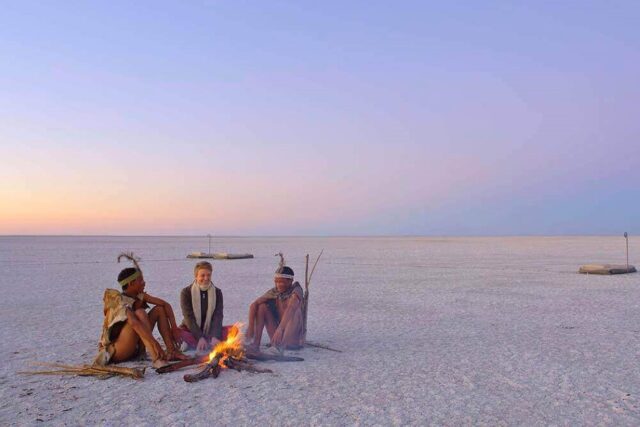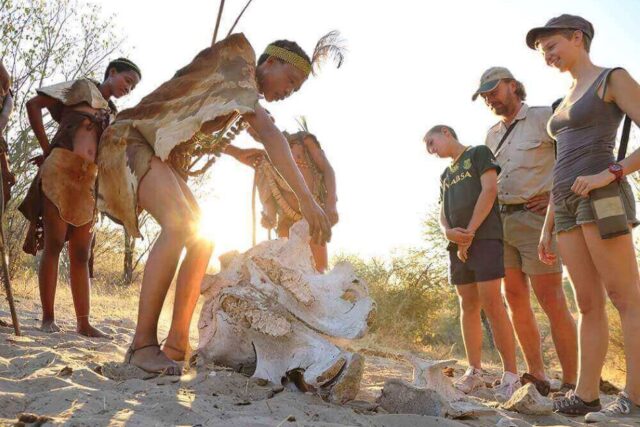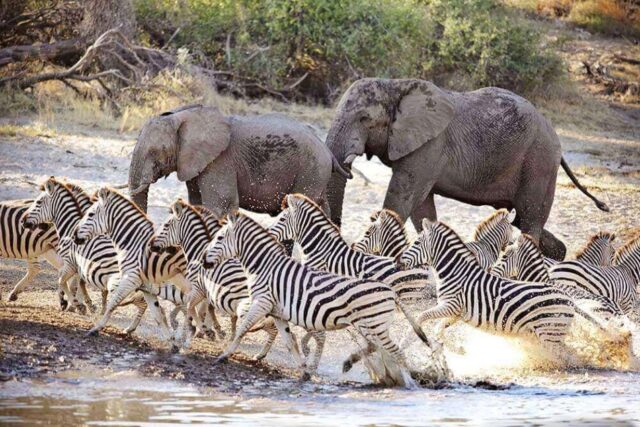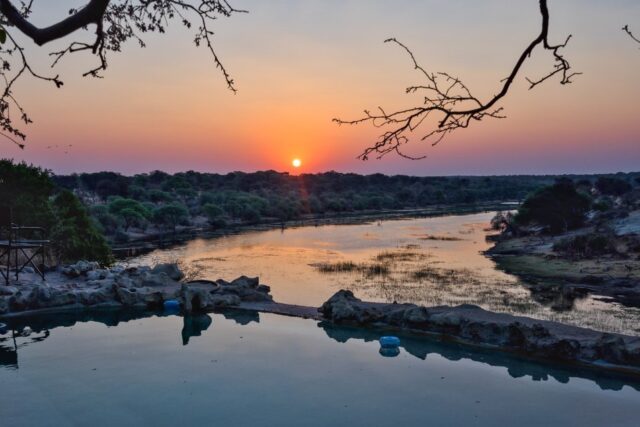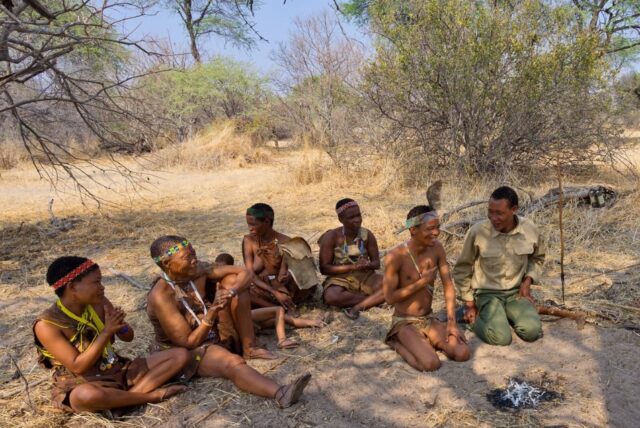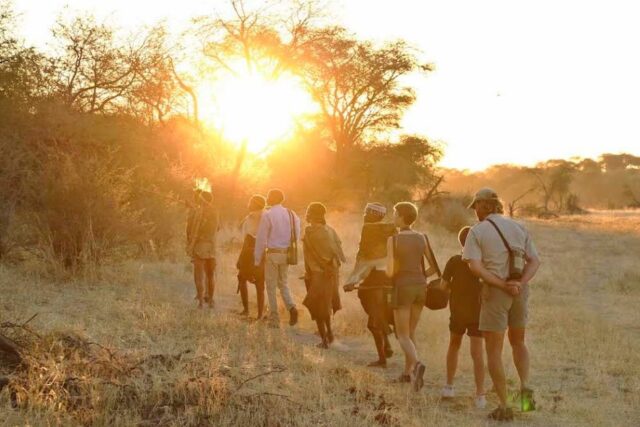Information
The safari never stops at Meno a Kwena, a hidden gem of a camp perched on a rocky clifftop above the Boteti River in Botswana. With a glittering roster of activities, including day trips to the Makgadikgadi Pans, guided walks with the San bushmen, and wildlife-watching boat trips, there’s plenty to get your teeth into. But sometimes, the best game viewing is where you least expect it, and at Meno, it’s right in front you. From their lofty position, the ten tents look down on a menagerie of animals at the water below, from herds of majestic elephant, to dazzles of nomadic zebra – all you need to do is sit back, and take it all in.
At just 90 minutes by road from Maun, Meno is a good option if you’re travelling as a group, or with little ones (or even big ones!). The camp was originally used by Southern Africa’s legendary explorers, and although we’ve added a few little touches here, and some little quirks there, it’s refreshingly and stylishly simple. And actually, the real treat at Meno is the connection with nature; when an elephant provides your alarm call in the morning, and you can game view straight from your private veranda, nothing else really matters.
Meno a Kwena is open all year round, and almost every month heralds a different highlight. During the dry season, from April to October, the Boteti River is the only source of water for miles around, and hundreds of animals, predators and prey, assemble on the banks, making for truly remarkable game viewing – and you don’t even have to leave camp! April is the culmination of the Africa’s second largest mammal migration, and the wildebeest and zebra join the resident wildlife at the river in their masses. In the Makgadikgadi, the lunar-like salt flats glint in the sunlight and a haze shimmers above the ground. This is the desert in its most iconic state, and a jaw-droppingly magical sight.
As the clouds gather and the rains begin to fall in the wet season, the Makgadikgadi is transformed into a blanket of glittering, green grass. The beasties of the migration begin their journey back to the salt pans lured by the promise of nutrients, and to breed in the fertile environment. In fact, the entire area is transformed into a Garden of Eden that has to be seen to be believed.
Seasonality
Green season: 10th January to 31st March
Shoulder season: 1st April to 14th June; 1st November 9th January
High season: 15th June to 31st July; 1st September to 31st October
Peak season: 1st – 31st August
Meno a Kwena is a place that’s steeped in history. This was the camp used by legendary explorers and crocodile hunters, back in the days when there were no vehicle trails across the Kalahari. Over the years, it’s been carefully refurbished, but the old-world charm and rustic quirkiness is as present as ever. You’ll find a roof fashioned from an old parachute, a lounge jam-packed with knick-knacks and trinkets from decades of travel, and an enormous crocodile skull to name but a few! This is a camp with heart, soul and a real flavour of Botswana.
In 2012, researchers discovered Botswana’s zebra migration. At Meno a Kwena, we’ve known about it for decades, and the arrival of the tens of thousands of zebra in a dazzle of black and white stripes is one of the (many) highlights of our year. The position of the camp, perched atop a cliff overlooking the Boteti, is quite simply the best spot in the area for migration viewing, and the sightings are astonishing. Spend your days lounging on the day bed or trailing a toe in the swimming pool whilst the action happens below. At night, retreat to the dining table for a feast of flavour, accompanied by flickering lanterns and stories of old…
Rooms
Meno a Kwena isn’t a hyper-luxurious camp – and that’s why we love it. We don’t have private butlers and air conditioning, but what we do have are 10 classic tents perched on a 100-foot high clifftop overlooking the river and offering some of the best ‘armchair’ game viewing we’ve ever seen. Each is classically-styled, with a few eccentricities thrown in here and there; think locally-woven fabrics mixed with colonial-style furniture, and simple fittings brightened by snippets of colour. All have fully-equipped en-suite bathrooms, and there are two family units, both with inter-leading tents (one with three beds for children, one with 2 beds), perfect for the kids.
The canvas lounge and dining tents are piled high with books and trinkets, and decorated with old-world artefacts, and our piece de resistance – a sculpted crocodile! And it’s not there for no reason – Meno a Kwena literally translates as “teeth of the crocodile.” Keep an eye on the river below from just about comfy chair in the living area, or plunge into the Flintstone-esque rocky swimming pool, and watch the animals doing the same below you.
Accommodation & Amenities
- 10 tents: 6 twins, 2 kings, 2 family tents (1 with 1 King-size bed and 3 single beds; 1 with 1 King-sized bed and 2 3/4 beds).
En-suite bathrooms with indoor showers & outdoor showers - Swimming pool
Wifi available: No
Hairdryers: No - Battery charging facilities: in the mess tent & in room
- Complimentary laundry service
- Child policy: we welcome all ages
- Disabled access: please enquire with reservations
Facilities
The canvas lounge and dining tents are piled high with books, trinkets and artefacts, adding to the old-world feeling of the camp. There is a bar, library, refreshing, clifftop swimming pool and a floating hide.
The chefs at Meno a Kwena create good, wholesome food and all meals are prepared on an open fire. Please let us know of any dietary requirements prior to arrival.
Activities
Day trip game drives with bush picnic lunch into Makgadikgadi Pans National Park.
• Cultural walking safaris with the Kalahari Bushmen.
• Boat cruises – subject to water levels.
• Visits to the game viewing hide.
• Cultural visits to the local communities.
Sleep-out:
• Sleep-out under the stars on the Pans. NB this requires a minimum 3-night stay with a minimum of 2 guests and can be done in the dry season only. Subject to weather and dryness of the pans. Must be pre-booked
Full Day Game Drive within the Makgadikgadi National Park
Departing camp shortly after breakfast you can enjoy a full day of game viewing within the Makgadikgadi National Park. After a 90 min transfer to the Park gates, you will spend the day searching for the Park’s plethora of species. Lunch and tea is taken in picturesque locations along the bank of the Boteti River often with elephants and antelope for company, as they pass through.
Pans Sleep-out (June – October & subject to weather conditions)
Our Pans sleep out requires a minimum 3 night stay and a minimum 2 guests. You will depart Meno a Kwena after breakfast following your first night’s stay and drive to the edge of the salt pans for a picnic lunch (approximately 3-4 hours drive). Following an open-air siesta you continue to your campsite in time for sundowners. After a campfire dinner you will sleep under the vast skies with a myriad of spectacular stars to accompany you.
The following day you return to camp after a delicious breakfast at sunrise in time to join the Bushmen for a cultural walking experience and your final night with us. Please note that the sleep out must be booked in advance.
Boat Safari
Depending on the height of the Boteti River, you can take a 2 hour cruise along the river spotting many interesting birds that are nesting in the banks as well as a closer view of any mega fauna that is at the waters edge. Game drives into the National Park include a short boat transfer across the Boteti River.
Floating Hide
The floating hide is an additional activity that enhances the wildlife viewing opportunities right in front of camp. The hide offers you a new perspective to the wildlife activity in and around the river.
Bushman Walking Experience
Small families of Bushman from the Ju! Hoansi clan village of Xai Xai on the Botswana/Namibia border of the Kalahari Desert come to Meno a Kwena to share their knowledge of one of the last great nomadic tribes. This immensely interesting walking and cultural experience gives you an insight into their hunter/gatherer way of life as they have coexisted with wildlife for thousands of years. This gentle walk is very popular and appeals to all ages.

